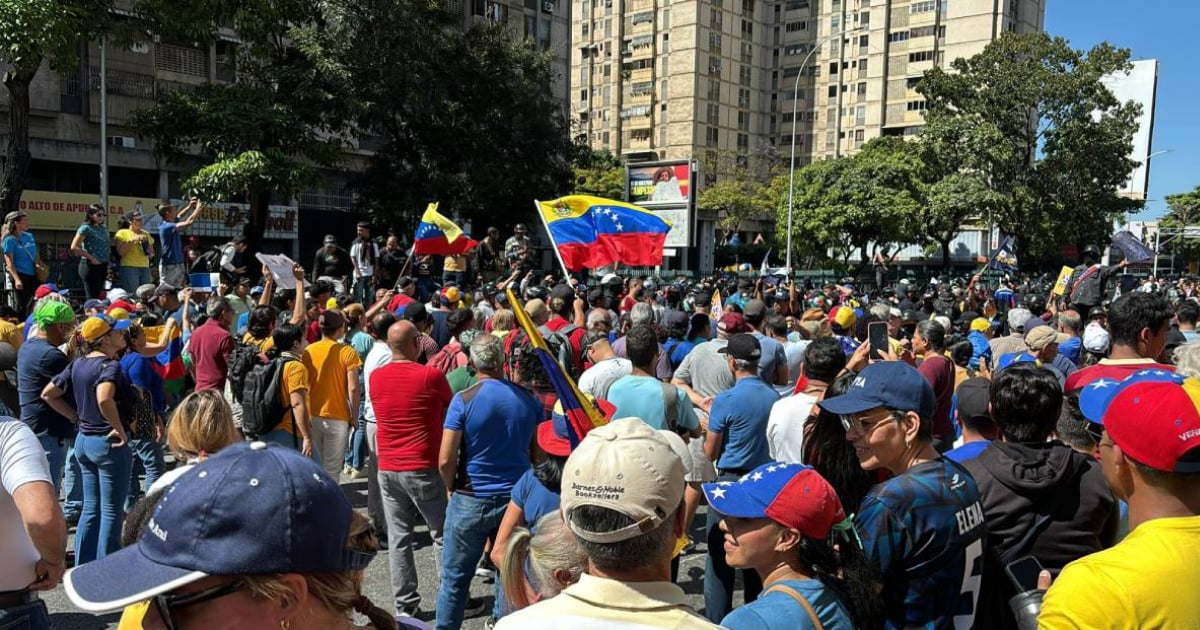
Related videos:
Opposition leaders Edmundo González and María Corina Machado expressed their gratitude to the people following the historic demonstrations on Thursday, January 9, which marked a new chapter in the fight for democracy in the country.
Thousands of citizens took to the streets in response to Machado's call, confronting the repression of the Nicolás Maduro regime.
González, who was participating in an event in the Dominican Republic, described the day as a demonstration of unity and courage.
"Venezuelans are not afraid! I was filled with pride and emotion to see the streets full of brave men and women demanding their rights. María Corina was freed thanks to the power of unity. We continue. Glory to the brave people!" he wrote on his official account on X.
For her part, María Corina Machado, who was released after being temporarily kidnapped by chavista forces, highlighted the courage of the Venezuelan people.
"Today, the Brave People demonstrated how to conquer fear. I have never felt so proud to be Venezuelan. I am now in a safe place and more determined than ever to stand with you until the end," she stated in a message addressed to the nation.
A day marked by repression and hope
During the protests, which took place in multiple cities across the country, Machado was violently intercepted and detained in Chacao, Caracas, while she was traveling by motorcycle.
Witnesses reported gunfire during the incident, in which a motorcyclist accompanying the opposition leader was injured. According to her campaign team, Machado was forced to record videos under duress before being released.
Despite the repression, the images of thousands of Venezuelans facing police barricades and chanting slogans against the regime reveal a society determined to challenge the dictatorship.
The protests also received support from international leaders and widespread condemnation of Maduro's regime for the kidnapping of Machado.
The political context: Maduro's inauguration
This Friday, Nicolás Maduro begins his third consecutive term, supported by the military and state powers, but overshadowed by allegations of electoral fraud and increasing international isolation.
In an attempt to consolidate his control, Maduro has reinforced the militarization of Caracas and closed the border with Colombia, claiming a supposed "international conspiracy."
Meanwhile, Edmundo González, acknowledged by opposition sectors as the legitimate winner of the elections on July 28, has announced his return to the country to assume his mandate and continue the fight for democratic change.
The situation in Venezuela is critical, with a regime facing profound international delegitimization and a people determined to fight for democracy. González and Machado's words of gratitude reflect the strength of a citizenry that, despite the risks, continues to demand freedom and justice.
Frequently Asked Questions about the Protests in Venezuela and the Opposition
Why were there massive protests in Venezuela on January 9, 2025?
The mass protests in Venezuela on January 9, 2025, were called by opposition leader María Corina Machado in response to allegations of electoral fraud in the elections held on July 28, 2024, where Nicolás Maduro was declared the winner. These demonstrations aim to demand democracy and freedom, defying the repression of Maduro's regime. The protests aim to demand justice and respect for the popular will.
What happened to María Corina Machado during the protests on January 9th?
During the protests on January 9, 2025, María Corina Machado was temporarily kidnapped by Chavista forces while riding a motorcycle in Chacao, Caracas. She was forced to record videos under duress before being released. This kidnapping highlights the political repression in Venezuela and the courage of the opposition in confronting the regime.
How did the international community react to the protests and the kidnapping of María Corina Machado?
The international community strongly condemned the kidnapping of María Corina Machado and the repression of protests in Venezuela. Leaders and international organizations expressed their support for the Venezuelan opposition and demanded the release of Machado. This incident has triggered a wave of global outrage, increasing pressure on Maduro's regime.
What is the political situation in Venezuela following the protests on January 9?
The political situation in Venezuela remains tense and critical following the protests on January 9. Nicolás Maduro continues to reinforce militarization in the country, while the opposition, led by figures such as María Corina Machado and Edmundo González, persists in its struggle for democracy and the recognition of its electoral victories. Maduro's regime is facing increasing international isolation and a strong internal opposition determined to challenge its authority.
Filed under: